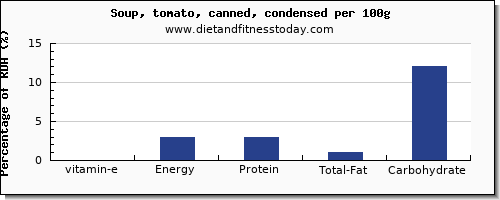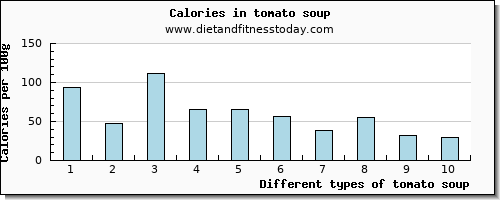Welcome to the nutritional vitamin e content in 10 different types of tomato soup, ranging from 1.73 mg to 0.17 mg per 100g. The basic type of tomato soup is Soup, tomato, canned, condensed, where the amount of vitamin e in 100g is 0.34 mg. 0.34 mg of vitamin e per 100g, from Soup, tomato, canned, condensed corresponds to % of the vitamin e RDA. For a typical serving size of 1.000 cup (or 148.00 g) the amount of Vitamin E is 0.5 mg. This corresponds to an RDA percentage of %.
The percentage of the recommended daily allowance (RDA) for vitamin e is based on a 15 mg RDA level for a mature adult.
Top five tomato soup products high in vitamin e
Below is a summary list for the top five tomato soup items ranked by the amount or level of vitamin e in 100g.
1. Soup, tomato rice, canned, condensed : 1.73mg
2. Soup, tomato rice, canned, prepared with equal volume water : 0.86mg
3. Soup, tomato beef with noodle, canned, condensed : 0.62mg
4. Soup, tomato, canned, condensed : 0.34mg
5. Soup, tomato, canned, condensed, reduced sodium : 0.34mg
Following on from the five top tomato soup items or products containing vitamin e we have a more comprehensive break down of Soup, tomato, canned, condensed, and the highest item containing vitamin e which is Soup, tomato rice, canned, condensed. We also give a comparison of average values, median values and lowest values along with a comparison with other food groups and assess the effects of storage and preparation on the 10 types of tomato soup.
At the bottom of the page is the full list for the 10 different types of tomato soup based on the content in different servings in grams and oz (and other serving sizes), providing a comprehensive analysis of the vitamin e content in tomato soup.
Soup, tomato, canned, condensed - Nutritional Content and Chart
The full nutrition content, RDA percentages and levels for Soup, tomato, canned, condensed should be considered along with the vitamin e content.Other important and vitamin e related nutrients are Energy, Protein, Total Fat and Carbohydrate. For this 100g serving in your diet, the amount of Energy is 66.00 kcal (3% RDA), the amount of Protein is 1.46 g (3% RDA), the amount of Total Fat is 0.44 g (1% RDA) and the amount of Carbohydrate is 15.22 g (12% RDA). The nutritional content and facts for 100g, which includes Energy, Protein, Total Fat and Carbohydrate is shown in the RDA chart below as percentages of the recommended daily allowance along with the vitamin e levels in tomato soup.

Our proprietary nutritional density score gives a nutritional value out of 100 based on 9 different vitamins, minerals and macro nutrients. Soup, tomato, canned, condensed has a nutritional value score of 18.00 out of 100.
Amount of vitamin e per 100 Calories
100 calories of soup, tomato, canned, condensed is a serving size of 0 g, and the amount of Vitamin E is 0 mg. Other important and related nutrients and macronutrients such as Total Fat, in 100 Calories are as follows; Energy 0 kcal (0% RDA), Protein 0 g (0% RDA), Total Fat 0 g (0% RDA), Carbohydrate 0 g (0% RDA). This is shown in the vitamin e RDA percentage chart below, based on 100 Calories, along with the other important nutrients and macro nutrients.
Content per Typical Serving Size 1.000 cup (or 148.00 g)
For the food Soup, tomato, canned, condensed the typical serving size is 1.000 cup (or 148.00 g) which contains 0.5 mg of Vitamin E. In terms of the gram weight and total content for this serving the Energy content is 97.68 kcal, the Protein content is 2.16 g, the Total Fat content is 0.65 g and the Carbohydrate content is 22.53 g. The percentages are shown below in the vitamin e chart, for the typical serving of vitamin e and the related and important nutritional values.
Macronutrients in Soup, tomato, canned, condensed
The amount of protein, fat and carbs from this food described above is measured in grams per 100g and grams in a typical serving size (in this case 1.000 cup or 148.00 g), although it is also useful to give the number of calories from protein, fat and carbohydrate which are the most important macronutrients. For this serving in your diet here are the macronutrient calories. From protein the number of calories is 6.0 (kcal).The total calories from carbohydrate is 85.6 (kcal).

Milligrams of vitamin e in tomato soup (per 100g)
This list of 10 types of tomato soup, is brought to you by www.dietandfitnesstoday.com and ranges from Soup, tomato rice, canned, condensed through to Soup, tomato, low sodium, with water where all food items are ranked by the content or amount per 100g. The nutritional vitamin e content can be scaled by the amount in grams, oz or typical serving sizes. Simply click on a food item or beverage from the list at the bottom of the page to give a full dietary nutritional breakdown to answer the question how much vitamin e in tomato soup.
The list below gives the total vitamin e content in the 10 items from the general description 'tomato soup' each of which show the vitamin e amount as well as Energy, Protein, Total Fat and Carbohydrate. Below, is the top 10 food items shown in the vitamin e chart. This gives a quick and easy dietary comparison for the different items, where each item is listed at the bottom of the page with a nutritional summary.

The corresponding nutritional value for tomato soup based on our density score out of 100 (ranked by the amount of vitamin e per 100g) is shown in the below nutritional density chart. 
The corresponding Calories for tomato soup ranked by the amount of vitamin e per 100g is shown below in the tomato soup calories chart. 
Effect of Preparation and Storage on vitamin e
The level of vitamin e can be affected by the method of storage for example canned or frozen and also by the method of preparation for example either raw, cooked or fried. The number of food items classified as canned is 8 items. The highest amount of vitamin e from the 8 canned items is in Soup, tomato rice, canned, condensed where the level is 1.73 mg per 100g.The number of food items described as lowfat or non-fat is 1 item.Average Content for tomato soup
The average (or more correctly the arithmetic mean) amount of vitamin e contained in 100g of tomato soup, based on the list below of 10 different items under the general description of tomato soup, is 0.49 mg of vitamin e. The averages for the different nutrients are as follows; the average amount of Energy is 59.40 kcal, the average amount of Protein is 1.57 g, the average amount of Total Fat is 1.17 g and the average amount of Carbohydrate is g.Median Amount
The median value of Vitamin E is found in Soup, tomato, canned, condensed, reduced sodium which in 100g contains 0.34 mg of Vitamin E. For this serving the amount of Energy is 65.00 kcal, the amount of Protein is 1.61 g, the amount of Total Fat is 0.56 g and the amount of Carbohydrate is 13.41 g.Highest vitamin e Content per 100g
Using the list below for the 10 different tomato soup nutrition entries in our database, the highest amount of vitamin e is found in Soup, tomato rice, canned, condensed which contains 1.73 mg of vitamin e per 100g. The associated percentage of RDA is %. For this 100g serving the Energy content is 93.00 kcal, the Protein content is 1.64 g, the Total Fat content is 2.12 g, the Carbohydrate content is 17.08 g. 
The lowest amount of vitamin e in 100g is in Soup, tomato, low sodium, with water which contains 0.17 mg. This gives as percentage of the recommended daily allowance % of the RDA. For this 100g serving the amount of Energy is 30.00 kcal, the amount of Protein is 0.79 g, the amount of Total Fat is 0.28 g, the amount of Carbohydrate is 6.57 g.
The difference between the highest and lowest values gives a vitamin e range of 1.56 mg per 100g. The range for the other nutrients are as follows; 63 kcal for Energy, 0.85 g for Protein, 1.84 g for Total Fat, 0 g for Carbohydrate.
Highest Amount of vitamin e per Serving
Please remember that the above gives an accurate value in 100g for high vitamin e foods in your diet. For example 100g of Soup, tomato, canned, condensed contains 0.34 mg of vitamin e. However, there are other factors to consider when you are assessing your nutritional requirements. You should also take into account portion sizes when you are considering the vitamin e nutritional content.
The food with the highest vitamin e content per typical serving is Soup, tomato rice, canned, condensed which contains 2.23 mg in 0.500 cup (4 fl oz) (or 129.00 g). For this serving the Energy content is 119.97 kcal, the Protein content is 2.12 g, the Total Fat content is 2.73 g and the Carbohydrate content is 22.03 g.
Nutritional Information Summary
From the list below you can find a full nutrition facts breakdown for all foods containing vitamin e which can be scaled for different servings and quantities. We have also sorted our complete nutritional information and vitamin database of over 7000 foods, to give a list of high content of vitamin e in foods.
| ||||||||||||||||||||||||||||||||||||||||||||||||||||||||||||||||||||||||||||||||||||||||||||||||||||||||||||||||||||||||||||||||||||||||||||||||||||||||||||||||||||||||||||||||||||||||||||||||||||||||||||||||||||||||||||||||||||||||||||||||||||||||||||||||||||||||||||||||||||||||||||||||||||||||||||||||||||||||||||||||||||||||||||||||||||||||||||||||||||||||||||||||||||||||||||||||||||||||||||||||||||||||||||||||||||||||||||||||||||||||||||||||||||||||||||||||||||||||||||||||||||||||||||||||||||||||||||||||||||||||||||